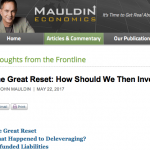John Mauldin: We are coming to a period I call the Great Reset ..
 John Mauldin has been writing his weekly articles for over 15 years. He has a huge audience worldwide. I met him once, years ago in Brussels and don’t know if he has read The Big Reset. But recently he started to talk about the coming ‘Great Reset’:
John Mauldin has been writing his weekly articles for over 15 years. He has a huge audience worldwide. I met him once, years ago in Brussels and don’t know if he has read The Big Reset. But recently he started to talk about the coming ‘Great Reset’:
We are coming to a period I call the Great Reset. As it hits, we will have to deal, one way or another, with the largest twin bubbles in the history of the world: global debt, especially government debt, and the even larger bubble of government promises. We are talking about debt and unfunded promises to the tune ofmultiple hundreds of trillions of dollars – vastly larger than global GDP. We are also going to have to restructure our economies and in particular how we approach employment because of the massive technological transformation that is taking place. But let’s keep the focus for now on global debt and government promises.
All that debt cannot be repaid under current arrangements, nor can those promises ultimately be kept. There is simply not enough money and not enough growth, and these bubbles are continuing to grow. At some point, we’re going to have to deal with these issues and restructure everything.
..
Whether the catalyst is a European recession that spills over into the US, or one triggered by US monetary and fiscal mistakes, or a funding crisis in China, or an emerging-market meltdown, the next recession will be just as global as the last one. And there will be more build-up of debt and more political and economic chaos.
President Trump is a fairly controversial figure, but I think most of us can agree that Trump is going to make volatility great again. The Great Reset will bring an increase in volatility, and the correlation among asset classes will once again approach 1.0, as it did during 2008–2009.
If I’m right about the growing debt burden, the recovery from the next recession may be even slower than the last recovery has been – unless the recession is so deep that we have a complete reset of all asset valuations. I don’t believe politicians and central banks will allow that. They will print and try to hold on as long as possible, thwarting any normal recovery, until markets force their hands.
But then, I can think of at least three or four ways that politicians and central bankers could react during the Great Reset, and each will bring a different type of volatility and effects on valuations. Flexibility will be critical to successful investing in the future.
So let’s sum up. In my opinion, the entire world is entering what I call the Great Reset, a period of enormous and unpredictable volatility in all asset classes. I believe that diversifying among asset classes will simply diversify your losses during the next global recession. And yet, active management seemingly has not been the answer. So what do we do?
I think the answer lies in diversifying among noncorrelated trading strategies that can invest in any asset class. For a reasonably sophisticated investment professional with sufficiently high assets, there are any number of ways to diversify trading strategies.

